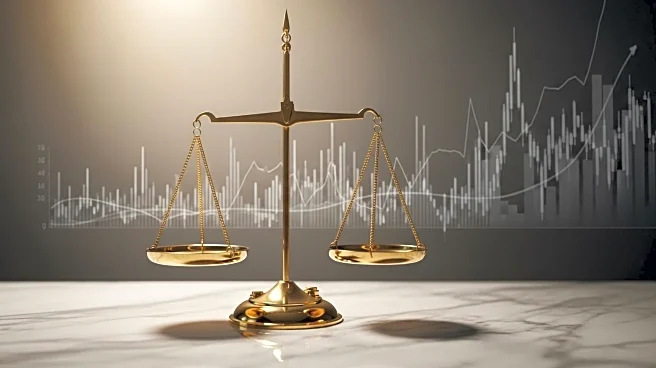What's Happening?
Inflation in the United States is showing signs of increasing, with the Consumer Price Index (CPI) expected to report a rise to an annualized rate of 2.9% for August, up from 2.7% in July. This comes as President Trump is advocating for the Federal Reserve to cut its benchmark interest rate, arguing that there is 'no inflation.' The President's call for a rate cut is aimed at reducing borrowing costs for consumers, potentially lowering interest fees on credit cards and loans. However, many Americans are still experiencing higher prices for groceries and household bills, leading to financial strain. The Federal Reserve faces a complex decision as it balances inflation control with promoting full employment, especially given recent disappointing job reports.
Why It's Important?
The potential rate cut by the Federal Reserve could have significant implications for the U.S. economy. Lower interest rates may encourage consumer spending and business investment, potentially stimulating economic growth. However, persistent inflation remains a concern, affecting household budgets and consumer confidence. The decision to cut rates could also impact the labor market, which has shown signs of stalling. The Federal Reserve's actions will be closely watched by economic stakeholders, as they navigate the dual mandate of controlling inflation while supporting employment. The broader economic environment, including tariffs and global economic conditions, adds complexity to the Fed's decision-making process.
What's Next?
The Federal Reserve is scheduled to make its next interest rate decision on September 17. The probability of a 0.25 percentage point rate cut is high, at 90%, according to CME FedWatch. There is also a 10% chance of a larger 0.5 percentage point cut. The decision will be influenced by the latest CPI data and labor market conditions. Stakeholders, including businesses and consumers, will be watching closely to see how the Fed's actions impact borrowing costs and economic activity. The outcome could have lasting effects on inflation trends and economic stability.
Beyond the Headlines
The ongoing debate over tariffs and their impact on inflation highlights the complex interplay between trade policies and domestic economic conditions. President Trump's administration has faced criticism for its tariff policies, which some economists argue contribute to rising prices. The Federal Reserve's decision-making process must consider these external factors, as well as the potential long-term effects on economic growth and consumer welfare. The situation underscores the challenges of managing economic policy in a globalized economy.








